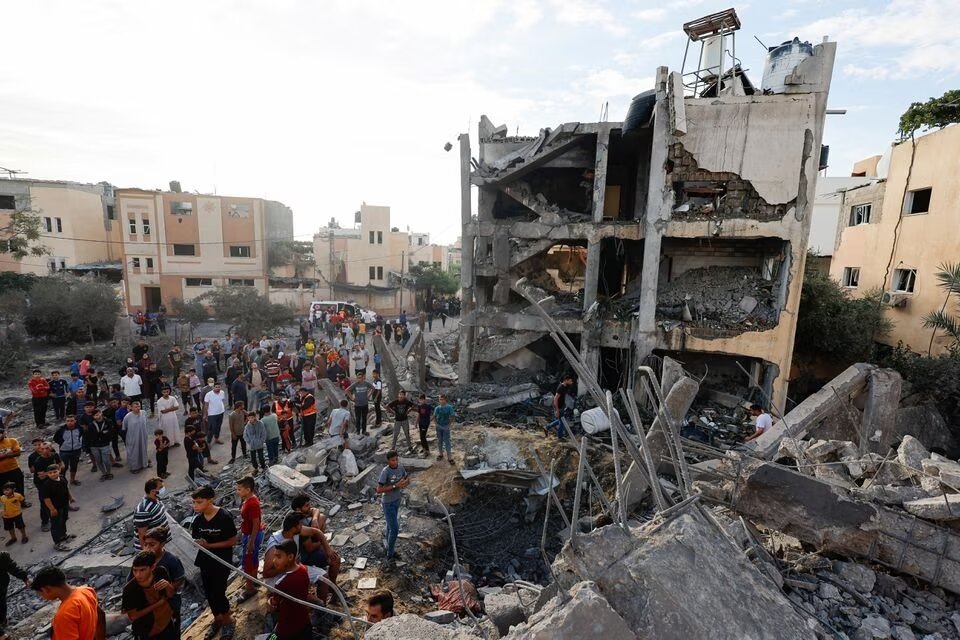Health minister urges WHO to take serious measures to help Palestinians

TEHRAN – Iranian Health Minister Bahram Einollahi held a phone call with Ahmed al-Mandhari, the World Health Organization director for the Eastern Mediterranean Region, urging him to take serious measures to help Palestinians under Israeli attacks.
“According to the report that we have from the regional office of the World Health Organization, the medical and treatment system in the Gaza Strip is unable to provide services for various reasons,” Einollahi told al-Mandhari, IRNA reported.
“Medical treatment centers in the Gaza Strip and the West Bank have been targeted in an inhumane manner, and the provision of aid to the injured has been disrupted.”
“In this period of history, it is necessary to make a determination to help the victims in occupied Palestine, and while supporting the oppressed people, we should provide the ground for alleviating their sufferings,” the health minister stressed.
He asked the World Health Organization not to let people's trust in this organization be damaged and that this organization take serious and effective measures to support the wounded in Gaza.
Einollahi also announced the country’s readiness to cooperate with the World Health Organization to provide health services and send medicine medical supplies and equipment to the injured and oppressed people of Palestine.
For Iranian doctors and nurses, it is heartbreaking and unbearable to see the people of Gaza who lack the most basic medical equipment and medicine for treatment, he highlighted.
Al-Manzari, for his part, said that medical aid consisting of medicine and equipment is ready to be sent to the Palestinian people, and “We are waiting for the opening of the Rafah crossing to send the supplies.”
He emphasized that he is negotiating with the Egyptian authorities in this regard.
On Saturday, Pirhossein Kolivand, the president of the Iranian Red Crescent Society (IRCS), sent a message to Mohammed Al-hadid, his Jordanian counterpart.
Referring to the large number of civilians, particularly women and children, who were killed and injured in armed conflicts in Gaza, Kolivand announced readiness to send humanitarian relief consignments as well as dispatch medical teams to Jordan to treat injured Palestinians.
On October 11, Kolivand sent a message to the president of the International Committee of the Red Cross (ICRC), asking for immediate action to be taken to prevent the attacks on innocent people in Gaza.
“I, hereby, as the President of the Iranian Red Crescent Society, and the President of the Iranian National Committee of the IHL, request you to use all necessary measures to stop the attacks on civilians,” IRCS president Pirhossein Kolivand wrote to the ICRC president Mirjana Spoljaric Egger.
“We think that Humanitarian Diplomacy could mitigate the negative impact of the current humanitarian crises and these protracted armed conflicts,” Kolivand added.
“As you know, in the last few days we have seen images and reports which are utterly horrific. Massive attacks against civilians in Gaza have led to the killing and wounding of hundreds of innocent civilians. If this situation continues to escalate, undoubtedly more civilians will severely suffer immensely.”
“The Iranian Red Crescent Society, such as the ICRC, is extremely concerned by the alarming intensification of armed violence in Gaza.
We believe that the ICRC, as the trustee of the Geneva Convention and IHL Rules and Principles, will make every effort to reduce the negative humanitarian impacts of this terrible situation.”
“In our role as a National Society in the region, we are ready to cooperate with the ICRC and its delegations in the region to dispatch humanitarian aid and consignment for the Palestinian people. We are sure that the joint cooperation between the two organizations can save the lives of many civilians and defenseless people in Gaza.”
The World Health Organization) said on Tuesday it needs urgent access to Gaza to deliver aid and medical supplies, as the U.N. agency warned of a long-term humanitarian crisis in the Palestinian enclave.
Dr Richard Brennan, regional emergency director of the WHO's Eastern Mediterranean regional office, said the agency was meeting with "decision-makers" on Tuesday to open access to Gaza as soon as possible.
MG
